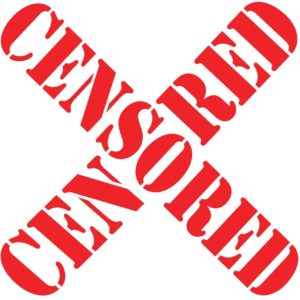The world has transitioned, in just the past two years, from the Information Age to the Misinformation Age. Amid the COVID-19 pandemic, misinformation is a word that has become fashionable and, as is so often the case, the political left has seized upon and weaponized it as a useful vehicle of blame and coercion. All the protests and pushback against the agenda of a vastly powerful globalist-leftist alliance can now be blamed on the spread of misinformation, while private citizens can be coerced into compliance by berating them that their hesitancy to toe the line is due to their embrace of dangerous untruths, which cannot be tolerated. It gets worse, though, because money always talks – and dealing with this entirely fabricated new threat has now become a lucrative business.

(Photo by Erik McGregor/LightRocket via Getty Images)
What exactly is misinformation, then, and why the suggestion that the threat it poses is an artificial construct? Misinformation is exactly what anyone wants it to be. The media has been regurgitating and spreading it for years. Among the many most recent noticeable examples: the death of Brian Sicknick, the Capitol Police officer allegedly beaten to death by Trump supporters on Jan. 6, 2021. In reality, Sicknick’s death was not connected in any way to the D.C. protest. The years-long fantasy of a conspiracy between former President Donald Trump and the Russian government to steal the 2016 election. The entirely unscientific insistence that a cloth mask is capable of preventing the passage of microscopic droplets – a claim recently shot down by even the Centers for Disease Control and Prevention (CDC).
Defining Misinformation
These are all excellent examples of misinformation and there are thousands more, but how does one define it? In the context of how the word is being commonly used today, misinformation could be described not just as a simple lie, but the weaving together of half-truths, anecdotal evidence, and the testimonies of those oh-so-famous anonymous sources to create a narrative designed to deceive or sow mistrust and doubt.
The problem is that the statist establishment has decided it gets to determine what is, and is not, misinformation. Thus, the word is used to label any speech or opinion that it, the ruling class, does not like or considers an obstacle on the path to its ultimate goals. Everyone, it seems, is now devoted to “fighting misinformation.” Among the most prominent examples, CNN and the social media platform Twitter are ramping up their war on misinformation. The left-wing cable news network recently announced the creation of a new team dedicated to exposing this scourge.
Monetizing Censorship
 We live in a capitalist world, though, despite what anyone believes – because it is the natural order of things – and some people will always find a way to make money out of any new crisis, real or imagined. Cue the rise of the “fact-checkers.” It is no longer just a few heavily left-leaning websites like Snopes and PolitiFact, dedicated to “debunking” anything that goes against leftist dogma and pretending it’s about defending the truth. Companies such as Trust Lab have sprung up, offering businesses an audit, of sorts, to scrub their websites of misinformation. Ironically – but also predictably – Trust Lab is run by a group of former social media executives; people who worked for Google, TikTok, Youtube, and Reddit. Yes, that’s right; some of the online platforms most guilty of practicing political censorship.
We live in a capitalist world, though, despite what anyone believes – because it is the natural order of things – and some people will always find a way to make money out of any new crisis, real or imagined. Cue the rise of the “fact-checkers.” It is no longer just a few heavily left-leaning websites like Snopes and PolitiFact, dedicated to “debunking” anything that goes against leftist dogma and pretending it’s about defending the truth. Companies such as Trust Lab have sprung up, offering businesses an audit, of sorts, to scrub their websites of misinformation. Ironically – but also predictably – Trust Lab is run by a group of former social media executives; people who worked for Google, TikTok, Youtube, and Reddit. Yes, that’s right; some of the online platforms most guilty of practicing political censorship.
Chillingly, the company says its team is “focused on creating the technology and partnerships to achieve our vision of a healthy and safe internet, with empowered users and trusted platforms.” Note, our vision. Fighting misinformation is not about separating fact from fiction, but about removing and banning anything that doesn’t conform to the approved, state-sanctioned narrative. We can expect the anti-misinformation business to become a very big deal in the coming months and years unless the reins of political power shift to people who are willing to expose the supposed threat from misinformation for what it really is.
This new trend, as it turns out, is a win-win for leftists; they have now found a way to monetize the censorship they have been promoting for decades. The delicious irony of turning the promotion of socialism into a capitalist endeavor.
In the end, it is all about justifying the silencing of political opponents and the shutting down of independent thought. Information and opinions not in line with establishment propaganda could not simply be countered because, in the marketplace of ideas and the arena of logic, the left is unable to compete. Thus, dissenting views – along with inconvenient facts – had to be labeled dangerous and subversive. The lesson, for those willing to heed it, is that people with good intentions will try, through argument and the presentation of verifiable facts, to convince critics they are wrong. This was a core tenet of true liberalism. But when a cabal instead brands its critics as dangerous and silences them, one can be assured good intentions are not a motivating factor.
~ Read more from Graham J. Noble.




